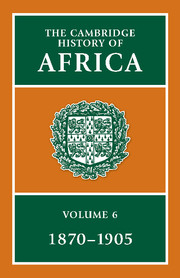Book contents
- Frontmatter
- Introduction
- 1 Africa on the Eve of Partition
- 2 The European Partition of Africa: Origins and Dynamics
- 3 North Africa
- 4 Western Africa, 1870–1886
- 5 Western Africa, 1886–1905
- 6 Western Equatorial Africa
- 7 Southern Africa, 1867–1886
- 8 Southern and Central Africa, 1886–1910
- 9 Portuguese Colonies and Madagascar
- A Angola and Mozambique, 1870–1905
- B Madagascar and France, 1870–1905
- 10 East Africa 1870–1905
- 11 The Nile Basin and the Eastern Horn, 1870–1908
- 12 The European Scramble and Conquest in African History
- Bibliographical Essays
- Bibliography
- Index
- Map 9 West Africa, c. 1870">
- Map 10 West Africa, c. 1905
- Map 13 The Congo Independent State
- Map 26 Ethiopia, the Nile Valley and the Horn in the era of Menelik II
- References
B - Madagascar and France, 1870–1905
from 9 - Portuguese Colonies and Madagascar
Published online by Cambridge University Press: 28 March 2008
- Frontmatter
- Introduction
- 1 Africa on the Eve of Partition
- 2 The European Partition of Africa: Origins and Dynamics
- 3 North Africa
- 4 Western Africa, 1870–1886
- 5 Western Africa, 1886–1905
- 6 Western Equatorial Africa
- 7 Southern Africa, 1867–1886
- 8 Southern and Central Africa, 1886–1910
- 9 Portuguese Colonies and Madagascar
- A Angola and Mozambique, 1870–1905
- B Madagascar and France, 1870–1905
- 10 East Africa 1870–1905
- 11 The Nile Basin and the Eastern Horn, 1870–1908
- 12 The European Scramble and Conquest in African History
- Bibliographical Essays
- Bibliography
- Index
- Map 9 West Africa, c. 1870">
- Map 10 West Africa, c. 1905
- Map 13 The Congo Independent State
- Map 26 Ethiopia, the Nile Valley and the Horn in the era of Menelik II
- References
Summary
RAINILAIARIVONY, 1870–85
With his power henceforth firmly established, Rainilaiarivony, the Prime Minister and consort of Queen Ranavalona II, could govern the country without too many worries, and was able to turn his attention to reforms. He was motivated to contemplate these reforms by his desire to strengthen the country and make his government conform to a European model. Christianity, which he had just adopted, entailed a certain number of changes which the ever more numerous and influential English missionaries were urging on him. But the prime minister had too much common sense, and had learned his lesson too well from the dreadful example of Radama II, to make too abrupt a break with the customs and traditional feelings of his people. His reforms were prudent, taking account both of the needs of his subjects and the requirements of his authority.
In 1873 the queen and her consort accompanied by the entire court travelled to Betsileo, and spent a month at Fianarantsoa, where they promulgated a code of laws specially formulated for that area: Imerina was still governed by the Code of 101 Articles. The other subject peoples retained their traditional customs and their chiefs under the supervision of Merina governors. The sale of alcohol was prohibited, at least in Imerina, as had already been the case in the days of Andrianampoinimerina, but this did not prevent some members of the upper class, in particular some of the royal princes, drinking to excess. In 1877 it was decided to free the ‘Mozambique’ slaves, that is, slaves of African origin.
Keywords
- Type
- Chapter
- Information
- The Cambridge History of Africa , pp. 521 - 538Publisher: Cambridge University PressPrint publication year: 1985

